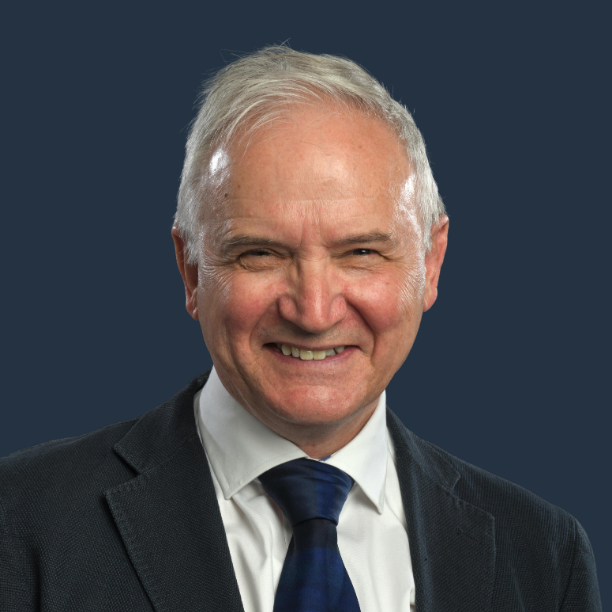.png)
Diana Brainard, MD
CEO, Allovir
Diana Brainard, MD, has more than 20 years of experience in the biopharmaceutical industry and academic medicine, has authored more than 200 publications, and has a passion for advancing therapies for devastating diseases.
Dr. Brainard is CEO at AlloVir, where she has served as CEO since 2021. Previously, Dr. Brainard spent over ten years at Gilead, where she played an enterprise-wide leadership role as the head of the virology therapeutic area overseeing the development and launch of some of the most successful drugs of the last decade including Sovaldi, Harvoni, Epclusa, and Biktarvy. In 2020, she led the company-wide initiative to rapidly advance remdesivir to become the first and only antiviral to receive regulatory approval for the treatment of SARS-CoV-2, which earned her global recognition as one of the most influential people in the fight against SARS-CoV-2. Her industry career began at Merck, where she held positions in clinical pharmacology and experimental medicine.
Dr. Brainard received her MD from Tulane University School of Medicine, and her BA in comparative literature from Brown University. Following completion of her medical training, she was on the faculty at Harvard Medical School where her NIH-funded research focused on HIV immunology and T-cell trafficking.
In addition to serving on Integer’s Scientific Advisory Board, Dr. Brainard serves as an Entrepreneur Partner at MPM Bioimpact and an independent board member at Nektar Therapeutics and Affinia Therapeutics.

Sumit Chanda, PhD
Professor, Scripps Research, Department of Immunology and Microbiology
Senior Principal Investigator Calibr at Scripps Research
Dr. Chanda’s lab is part of the Scripps Research Institute, Department of Immunology and Microbiology. Dr. Chanda has contributed to the fight against many viral diseases including SARS-CoV-2, the cause of COVID illness, as well as influenza, Dengue virus and HIV. His work examines not only how pathogens infect cells, but how the immune system responds, with an eye toward prevention and treatment.
The Chanda Lab exploits systems-based approaches and cutting-edge technologies to study the virus-host interface and innate immunity, with a focus on RNA viruses that pose a pandemic threat. Finding from the Lab drive drug discovery efforts through Calibr, translational research arm of Scripps, including the development of next-generation antivirals, adjuvants for vaccines, and immunotherapies. The Lab’s research efforts are supported by the Gates Foundation, the US Department of Defense, the Martin Delaney Collaboratory, AViDD and other NIH contracts, cooperative agreements and grants. The group has also partnered with major pharmaceutical and biotech companies for early-phase drug discovery in the field of antivirals and inflammatory diseases.
Chanda has produced major advances in other areas, as well. He helped discover how HIV suppresses the innate immune response. Innate immunity is a non-specific response to infection, such as inflammation, which can both protect and harm if it becomes overly aggressive or chronic.
Chanda earned his doctorate in molecular pharmacology from Stanford University in 2001, and he says that experience in Silicon Valley inspired his motivation to improve scientific methodology with technological innovations. To that end, he is the founder of a widely used open-source tool for annotating genes, called metascape.org. From Stanford, Chanda joined the Genomics Institute of the Novartis Research Foundation in La Jolla, where he went on to lead his first research group in its Division of Cellular Genomics, working with Schultz. He subsequently joined Sanford-Burnham Medical Research Institute in 2007. Since 2015, he directed its Immunity and Pathogenesis program.

Michael S. Diamond, MD, PhD
The Herbert S. Gasser Professor, Departments of Medicine, Molecular Microbiology, Pathology & Immunology, Washington University
Dr. Diamond’s laboratory studies the molecular basis of disease of globally emerging RNA viruses, and focuses on the interface between pathogenesis and host immunity. He identified many of the key innate and adaptive immune system components that define protection against flaviviruses, and the viral genes that antagonize this response.
His laboratory has made significant contributions, including as example, identifying a novel pathogen-associated molecular pattern and mechanism of innate immune restriction proteins. His group has used genome-wide screening to identify host factors required by viruses, including novel entry receptors for multiple alphaviruses of global concern. He has led the field in studying mechanisms of pathogenesis of Zika virus infection and disease including in pregnancy, and more recently studied how the microbiome modulates immunity and infection of arthropod-transmitted viruses. His group also has generated, characterized, and mapped thousands of neutralizing antibodies against Zika, West Nile, Dengue, Mayaro, and Chikungunya viruses. His work has led directly to the development of antiviral therapeutic antibodies and vaccines against both flaviviruses and alphaviruses. Most recently, his laboratory has begun efforts to study the biology and pathogenesis of SARS-CoV-2 and is pursuing strategies for developing antibody and vaccine countermeasures and novel mouse models of disease and identifying correlates of immune protection.
Dr. Diamond earned his B.A., Political Science from Columbia University, PhD, Cell and Developmental Biology from Harvard University and his MD from Harvard Medical School, Harvard University, Boston. He is an elected member of the American Society of Clinical Investigation, Association of American Physicians, American Association for the Advancement of Science, and the National Academy of Medicine. He is also a recipient of Stanley J. Korsmeyer Award of the American Society of Clinical Investigation and currently an elected Councilor for the Association of American Physicians.

K. Christopher Garcia, PhD
Younger Family Professor and Professor of Structural Biology;
Stanford University
Howard Hughes Medical Institute (HMMI)
Dr. Garcia is Professor of Molecular and Cellular Physiology and of Structural Biology at the Stanford University School of Medicine. He is also an Investigator in the Howard Hughes Medical Institute. He received his B.S. in biochemistry from Tulane University, and his Ph.D. in biophysics from Johns Hopkins University. After two years of post-doctoral work at Genentech, Inc. under Dr. David Goeddel in the Dept. of Molecular Biology, where he learned the emerging technologies of protein engineering and recombinant protein expression, Dr. Garcia moved to a second post-doctoral fellowship at The Scripps Research Institute in the laboratory of Prof. Ian Wilson, where he succeeded in determining the first crystal structures of the T-cell receptor and then its complex with peptide-MHC.
In 1999, Dr. Garcia started his lab at Stanford University School of Medicine where he has progressed to Full Professor. Dr. Garcia was elected to the National Academy of Sciences in 2012 and the National Academy of Medicine in 2016. Dr. Garcia’s laboratory continues the investigation of structural and functional aspects of cell surface receptor recognition and activation, in receptor-ligand systems with relevance to human health and disease.
The Garcia Lab uses structural information on receptor-ligand complexes to engineer variant proteins and/or surrogates to manipulate receptor signaling and cellular function, with an eye towards therapeutic applications. The receptor systems studied derive principally from the immune system (TCR/MHC, cytokines, chemokine GPCR). Their focus is on “shared” pleiotropic cytokine receptors to understand the biophysical basis by which different ligands are able to elicit unique intracellular responses and functional outcomes, as well as to exploit this information to engineer receptor-specific ligands. In addition to IntegerBio, Dr. Garcia has founded or co-founded several biotech companies, including Synthekine, Surrozen (Wnt agonists), 3T (TCR antigen discovery) and ALX Oncology (SIRP/CD7 antagonist).

Robert Gish, MD
Loma Linda University, University of Las Vegas & Reno, University of California, San Diego, and Medical Director, Hepatitis B Foundation
Robert G. Gish, MD, is principal at Robert G. Gish Consultants LLC, a medical consulting company for liver and liver transplant programs, diagnostics and therapeutics companies who operate in the liver disease and liver health space.
He was the Medical Director at the University of California, San Diego Health Systems from 2010 to 2013 in the Center for Hepatobiliary Disease and Abdominal Transplantation and Clinical Professor of Medicine at UCSD during this same tenure. From 2014 to 2019 Dr. Gish served at Stanford University with major roles in outreach programs. He is currently a Clinical Professor of Medicine at the University of Nevada Las Vegas and Reno, and Professor of Medicine at Loma Linda University. He serves as an Adjunct Professor of Pharmacy at Skaggs School of Pharmacy and Pharmaceutical Sciences at UCSD. In addition, he is also Medical Director of the Hepatitis B Foundation in Doylestown, Pennsylvania.
Dr. Gish received his medical degree from the University of Kansas Medical School in 1980 after completing an undergraduate program in Pharmaceutical Sciences. He completed a 3-year Residency in Internal Medicine at the UCSD, and a fellowship in Gastroenterology at UCLA, during which time he was awarded the National Institutes of Health (NIH) Physician Scientist Award.
Dr. Gish has an active research program in viral hepatitis. He has published more than 600 original articles, abstracts, and book chapters, and more than 120 peer-reviewed publications. Dr. Gish is also actively involved in numerous professional societies, including the American Association for the Study of Liver Diseases and the American Society of Transplant. He is a fellow of the American College of Physicians as well as 10+ other national and international organizations. Dr. Gish’s participation in various San Francisco and San Diego Hep B Free campaign activities has led to the screening of over 6,000 people for viral hepatitis.
is principal at Robert G. Gish Consultants LLC, a medical consulting company for liver and liver transplant programs, diagnostics and therapeutics companies who operate in the liver disease and liver health space.
He was the Medical Director at the University of California, San Diego Health Systems from 2010 to 2013 in the Center for Hepatobiliary Disease and Abdominal Transplantation and Clinical Professor of Medicine at UCSD during this same tenure. From 2014 to 2019 Dr. Gish served at Stanford University with major roles in outreach programs. He is currently a Clinical Professor of Medicine at the University of Nevada Las Vegas and Reno, and Professor of Medicine at Loma Linda University. He serves as an Adjunct Professor of Pharmacy at Skaggs School of Pharmacy and Pharmaceutical Sciences at UCSD. In addition, he is also Medical Director of the Hepatitis B Foundation in Doylestown, Pennsylvania.
Dr. Gish received his medical degree from the University of Kansas Medical School in 1980 after completing an undergraduate program in Pharmaceutical Sciences. He completed a 3-year Residency in Internal Medicine at the UCSD, and a fellowship in Gastroenterology at UCLA, during which time he was awarded the National Institutes of Health (NIH) Physician Scientist Award.
Dr. Gish has an active research program in viral hepatitis. He has published more than 600 original articles, abstracts, and book chapters, and more than 120 peer-reviewed publications. Dr. Gish is also actively involved in numerous professional societies, including the American Association for the Study of Liver Diseases and the American Society of Transplant. He is a fellow of the American College of Physicians as well as 10+ other national and international organizations. Dr. Gish’s participation in various San Francisco and San Diego Hep B Free campaign activities has led to the screening of over 6,000 people for viral hepatitis.
.png)
Camille Kotton, MD, FIDSA, FAST
Clinical Director, Transplant and Immunocompromised Host Infectious Diseases, Massachusetts General Hospital and Associate Professor of Medicine, Harvard Medical School
Dr. Kotton is a distinguished physician and academic, renowned for her expertise in infectious diseases, particularly in immunocompromised patients. She holds the position of Associate Professor of Medicine at Harvard Medical School and serves as the Clinical Director of Transplant and Immunocompromised Host Infectious Diseases at Massachusetts General Hospital.
Dr. Kotton’s career is marked by her dedication to advancing the field of infectious diseases through both clinical practice and research. She has made significant contributions to the understanding and management of infections in transplant recipients and other immunocompromised populations.
Dr. Kotton treats patients before and after solid organ and bone marrow transplant, as well as other immunocompromised hosts. Her interests include vaccination, travel medicine for transplant recipients, and reducing the infectious risks of immunocompromising medications. Her work has been pivotal in developing guidelines and protocols that enhance patient care and outcomes.
She has written numerous articles and chapters and speaks nationally and internationally on a regular basis. Dr Kotton has served as the chair of The Infectious Disease Community of Practice of The American Society of Transplantation. She has also served as the president of The Transplant Infectious Disease Section of The Transplantation Society. Highlights of her work include the development of 4 versions of the international guidelines on CMV management after solid organ transplant and updated international guidelines on BK management, all published in Transplantation. She is the first transplant infectious disease specialist to be on the executive committee of The Transplantation Society.
She has received multiple awards for excellence in teaching as well as recognition from professional peer organizations and industry recognizing her demonstrated excellence in research, the clinical impact of her contributions, leadership in the field and her record of publications.
Dr. Kotton received her Medical Degree from University of Chicago Pritzker School of Medicine; completed her Residency, Hospital of the University of Pennsylvania and served in a Fellowship, Massachusetts General Hospital. She is Board certified in Infectious Disease by the American Board of Internal Medicine.

Peter Openshaw, MD, PhD, CBE
Professor of Experimental Medicine, Imperial College London
Peter Openshaw MD PhD CBE is Professor of Experimental Medicine at Imperial College London, UK and has joined our SAB, via Imperial Consultants. Dr. Openshaw, a respiratory physician and mucosal immunologist, is providing his independent expertise informed by his extensive research focused on how the immune response both protects against viral infection but also causes disease.
With an h-index of 105, and over 400 co-author credits, his publications on vaccinology, the immunopathogenesis of pulmonary viral diseases and lung inflammation have made significant contributions to the field. He is especially known for his work on respiratory syncytial virus (RSV), influenza and COVID-19, and for the development of human challenge in volunteers.
He was the first clinical President of the British Society for Immunology (2013-18) and served on many grant committees and Advisory Boards, becoming an Honorary Lifetime Member of the British Society for Immunology (2019). He has received prizes for his lifetime contribution to RSV research (Chanock Award, 2012), the European Federation of Immunological Societies Award (2014) and the Per Brandtzaeg Distinguished Scientific Achievement Award in mucosal immunology (2024).
He has built strong connections with journalists in print, radio and TV and used social media to promote accurate reporting of science stories, especially in relation to vaccines and respiratory disease. For example, he appeared over 100 times on national and international TV and radio between March 2021 and March 2022, explaining the complexities behind the COVID-19 pandemic response.
He was made a Commander of the British Empire for services to Medicine and Immunology in the 2022 UK New Year’s Honours and received the 2024 Imperial College Medal for his work as a Consul, supporting the development of the university’s Ethos, Values and Behaviours (Respect, Collaboration, Excellence, Integrity and Innovation).
Dr. Openshaw of Imperial College London has been commissioned, via Imperial Consultants, to provide his independent expertise to IntegerBio.

